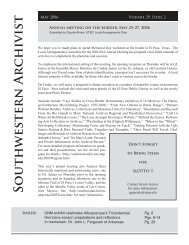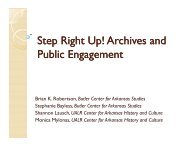MS SSA Newsletter - The Society of Southwest Archivists
MS SSA Newsletter - The Society of Southwest Archivists
MS SSA Newsletter - The Society of Southwest Archivists
Create successful ePaper yourself
Turn your PDF publications into a flip-book with our unique Google optimized e-Paper software.
Page 8 <strong>Southwest</strong>ern Archivist<br />
<strong>The</strong> US Patriot Act :<br />
Should <strong>SSA</strong> take a stand?<br />
By <strong>SSA</strong> Pr<strong>of</strong>essional and Public Affairs Committee<br />
<strong>The</strong> Uniting and Strengthening America By Providing Appropriate Tools Required To Intercept And Obstruct Terrorism<br />
(USA PATRIOT Act) Act <strong>of</strong> 2001 (Public Law 107-56). By now everyone has heard or read about it and has<br />
their opinion about it, but what impact is it having on our work in the archival world? One thing this law has done is<br />
give us reason to reconsider our day to day operating records. Institutions have begun to think about what information<br />
is retained about patrons, for what reason and for how long. Section 215 <strong>of</strong> the USA PATRIOT Act makes provision<br />
for law enforcement to be able to access patron usage information records with no one other than those persons necessary<br />
to produce the information having knowledge <strong>of</strong> the search warrant. Here at the University <strong>of</strong> New Mexico<br />
and other institutions in the state <strong>of</strong> New Mexico policies and procedures have been developed or revised in relation<br />
to this issue.<br />
Various institutions have developed guidelines for responding to requests for patron information for their staff to, as<br />
one person stated, "take some <strong>of</strong> the anxiety out <strong>of</strong> the process." Since the Center for <strong>Southwest</strong> Research is part <strong>of</strong><br />
the General Library at the University <strong>of</strong> New Mexico it is required to follow University and State policy. After a Library<br />
staff meeting with the University counsel to discuss the issue, a procedural document was written and approved<br />
by the University counsel, then made available to General Library staff. <strong>The</strong> New Mexico State Library Division<br />
Department <strong>of</strong> Cultural Affairs has also written its policy relating to how the State Library will respond to law enforcement<br />
requests for patron information under the USA PATRIOT Act. In addition to responding to law enforcement<br />
requests, another aspect <strong>of</strong> dealing with this law is how institutions educate their users and communities about<br />
the issue. One way is to publicize information about the possible surveillance <strong>of</strong> libraries and library users by law<br />
enforcement agencies. Resolutions passed by various cities in New Mexico such as Albuquerque require the cities'<br />
library system to post a notice that notifies all library users about the provision <strong>of</strong> the USA PATRIOT Act that allows<br />
their personal library records to be obtained by the federal government without their knowledge.<br />
<strong>The</strong> need for written guidelines for retention <strong>of</strong> records like circulation, correspondence or e-mail reference questions,<br />
photocopy requests, and patron sign in sheets is under discussion. An article in the August 25, 2003 issue <strong>of</strong> Hitchhiker,<br />
the New Mexico State Library newsletter, http://www.stlib.state.nm.us/hiker2/h2003/hh1512.html describes<br />
records and legal responsibilities. <strong>The</strong> article states that "Libraries that have written schedules and follow the schedules<br />
faithfully will have written documentation describing how their records are managed should law enforcement<br />
ever approach them in an investigation." A record retention schedule for this type <strong>of</strong> material may already exist at<br />
your institution. If not, now would be the time to create one. When writing a retention schedule reconsider why this<br />
information is needed and always keep in mind institutional and state laws regarding records. What information is<br />
accumulated while interacting with patrons, how will it be used and when is it no longer needed? <strong>The</strong> information<br />
could be used to show which collections are used, how many patrons come to your institutions, where they come<br />
from, and who used what in case items are discovered missing later. Once statistical data is recorded, a disposal<br />
schedule for the documents can be developed. Some documents could be disposed <strong>of</strong> sooner than others. Information<br />
does not need to be kept just because it has been done that way for years. Think about why it was necessary to have<br />
this data. <strong>The</strong> USA PATRIOT Act gives us all reason to re-evaluate what patron records need to be retained and for<br />
how long.<br />
<strong>SSA</strong>’s Pr<strong>of</strong>essional and Public Affairs Committee is asking for your opinion on the<br />
USA PATRIOT Act <strong>of</strong> 2001 (Public Law 107-56).<br />
If you feel that <strong>SSA</strong> should, or should not, voice an <strong>of</strong>ficial and unified position statement on this matter, we would<br />
like to hear about it. <strong>The</strong> Committee includes Cecilia Aros Hunter, chair, Twyla S. Reinig and Melanie I. Sturgeon.<br />
Our full contact information is listed in the August 2003 issue <strong>of</strong> this publication.








